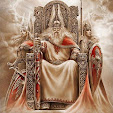The Witcher is a fantasy series of novels and short stories written by Polish author Andrzej Sapkowski. The series revolves around the titular "witcher", Geralt of Rivia. In Sapkowski's works, "witchers" are beast hunters who develop supernatural abilities at a young age to battle wild beasts and monsters. The books have been adapted into a film (The Hexer), two television series (The Hexer and The Witcher), a trilogy of video games (The Witcher, Assassins of Kings and Wild Hunt), and a graphic novel series.
The series of novels is known as the Witcher Saga. The short stories and novels have been translated into numerous languages, including English, German, French, Italian, Spanish, Russian and Chinese. The books have been described as having a cult following in Poland and in Central and Eastern European countries. the video games have been very successful; as of 28 May 2020, The Witcher series have sold over 50 million copies worldwide. The books are...
1. The Last Wish - 1993
2. Sword of Destiny - 1992
3. Blood of Elves - 1994
4. Time of Contempt - 1995
5. Baptism of Fire - 1996
6. The Tower of the Swallow - 1997
7. The Lady of the Lake - 1999
8. Season of Storms - 2013
The Witcher short stories by the author Andrzej Sapkowski were first published in Polish science fiction and fantasy magazine Fantastyka, beginning in the mid-1980s. The first short story, "Wiedzmin" (1986), was written for a contest held by the magazine and won third place. The first four stories dealing with the witcher Geralt of Rivia were originally featured in a 1990 short story collection titled Wiedzmin (The Witcher), now out of print, with "The Road with no return", which is set before the Witcher stories and features Geralt's mother-to-be.
The second published short story collection was "Sword of Destiny" (Miecz przeznaczenia). Although "The Last Wish", was published after "Sword of Destiny", it replaced "The Witcher" as the first book since it included all the stories in "The Witcher", except "The Road with No Return" (the only story without Geralt). Although new short stories were added to "The Last Wish", they took place before those in "Sword of Destiny".
Although "The road with no return" and "Something ends, something begins", an alternative ending of the Witcher saga about Geralt and Yennefer's wedding written as a wedding gift for Sapkowki's friends, were later published in 2000 in "Something Ends, Something Begins" and in 2012 in "Maladie and Other Stories" collections, the other stories in those books are unconnected to the Witcher series. In some Polish editions, "The road with no return" and "Something ends, Something Begins" are added to "The Last Wish" or "Sword of Destiny".
































